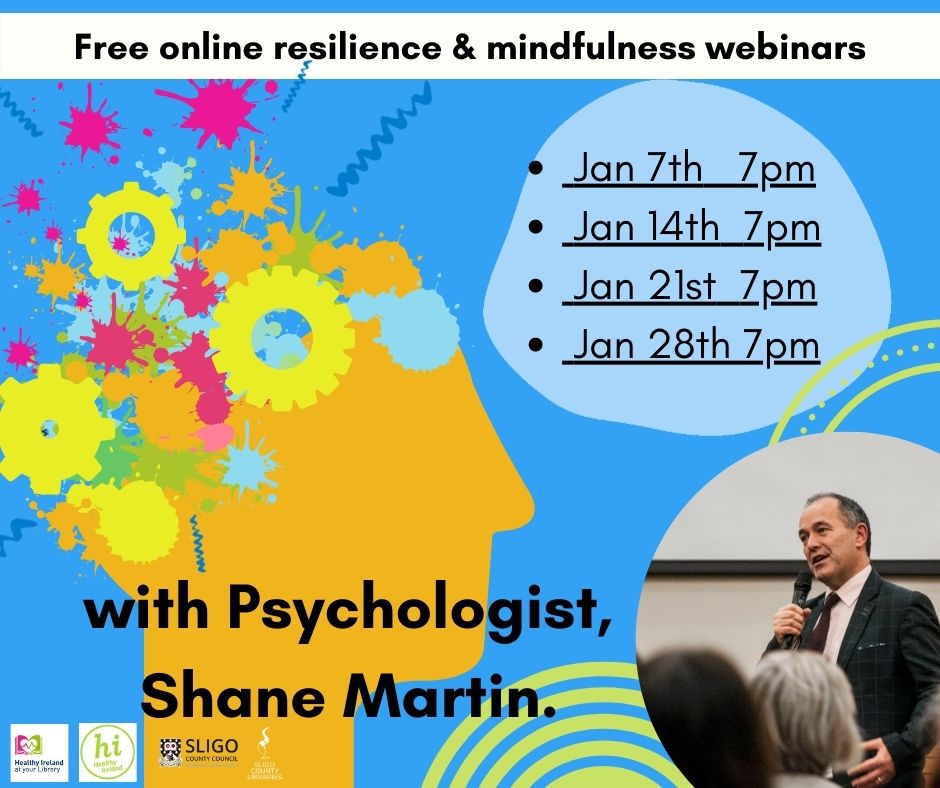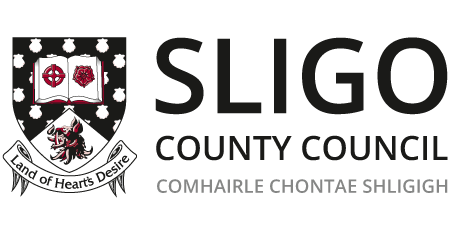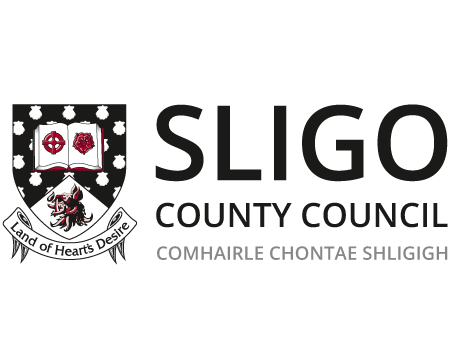Sligo Libraries, as part of the Healthy Ireland at Your Libraries programme, are delighted to present a Free Online Webinar series with Shane Martin, Psychologist C.Psychol.Ps.S.I. beginning tomorrow rhe 7th of January and every Thursday in January.
Free Online Webinar series with Shane Martin, Psychologist, via Zoom

Links can also be found on the Sligo Library Facebook and Instagram pages. No registration needed.
Week 1 | Your Precious Life - How to Live it Well with Shane Martin | 7th January 2021 7:00 pm
https://us02web.zoom.us/j/83738197871?pwd=Rzk3U3o2Nk1wQXA1U2UwUHl5TVhxUT09
This seminar will outline simple, practical, and most importantly, evidence-based strategies linked to a better quality of life. The hope is that it will uplift and inspire change in the lives of those who attend but even more importantly inspire participants to incorporate it into their homes, workplaces and communities.
Over many decades science has made a wonderful contribution in helping us understand negative emotion. The emphasis on deficits, disorders and disease has allowed for effective interventions to be developed in order to help and support people who are unwell or unhappy.
But why wait until we are unwell to learn about becoming healthier? Why wait until we are unhappy to explore happiness?
In recent years psychologists have started to examine positive emotion. This research has focused on what makes people happier, what gives them more meaning and purpose in life, and what measures they can take to lead to overall greater health.
Week 2 | Minding Ourselves with Shane Martin | 14th January 2021 7:00 pm
https://us02web.zoom.us/j/85187387229?pwd=OU1qdUlSbjBNNUQ3U0FMVVdHWE8wdz09
At the root to a lot of unhealthy stress is irrational thinking. We are all thinking beings and we have an ‘internal dialogue’ going on in our minds, almost as if we are talking to ourselves. However, we only ever express a fraction of this thinking. These private thoughts directly impact on our feelings and consequently how we interact with others. When emotionally distressed we can make conclusions about ourselves, others and the world without recourse to the ‘voice’ of reason. This is why we do not all make the same sense of the same things. The very best of us are vulnerable to illogical, irrational and unhelpful thinking, particularly when emotional or under pressure. In a climate of increasing stress due to changes within the work environment we need to make the best possible sense of changes and challenges.
How thinking affects how we feel and behave will be demonstrated. Staff will learn about unhelpful thinking and belief systems. They will learn how to become more rational and compassionate in their approach to work and life in general. Evidence- based strategies that are linked to positive mental health and help keep us positive during challenging times will be taught.
Week 3 | The Science of 'Bouncibility' (Resilience) with Shane Martin | 21st January 7:00 pm
https://us02web.zoom.us/j/82862078256?pwd=dkZQWG1ZbFl1M05oazNUWVlVck1TQT09
Life is an imperfect journey and crisis is guaranteed. There will always be setbacks and misfortunes. Resilience is the ability to adapt to the challenges of life. It’s about bouncing back rather than falling apart. If you are strong in resilience you have this ‘bouncibility’ and can harness your inner strengths and coping mechanisms. Others need to learn the skills at the heart of resiliency. If life is full of challenges then we need to know how to not only withstand the pressure but to thrive in adversity.
If you are low in resilience, you will focus too much on your problems and deficits and be overwhelmed during challenges. You will be drawn towards unhealthy conclusions and become more vulnerable instead of stronger. Becoming more resilient will not mean that problems disappear. It does not mean that you have to become ‘as hard as nails’. Resilience is more about learning how to cope – tapping into our own resources and fostering inner-strengths in order to stay ‘standing’ during and after crisis.
Science has uncovered specific traits/factors that can be utilised at work and in our lives in general. This seminar outlines evidence-based strategies linked to greater outcomes during challenge and change.
Week 4 | Fostering Creativity for the sake of our health and happiness with Shane Martin | 28th January 7:00 pm
https://us02web.zoom.us/j/82191336024?pwd=RVBVVHhsdXZZb0pxMm55Wjdkak1kZz09
Many people assume that creativity is something we had as a child but lost, or something gifted to specific individuals that are naturally ‘talented’. But science has shown that, in many ways, we are all wired to create. Creativity is multifaceted—on the level of the brain, personality, and the creative process. It can be displayed in many different ways. New studies suggests that small acts of creativity in everyday life increase our overall sense of well-being. By cultivating some creativity in our lives we can potentially reduce our vulnerability to stress and enhance our levels of life satisfaction.

